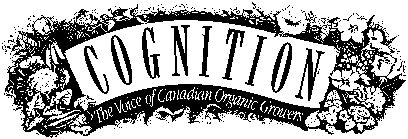

Cognition Index | Virtual Library
| Magazine Rack
Search
| Join the Ecological Solutions Roundtable
Seedy Saturday
by Dan Jason
This winter seed fair and social event is also a dedication to a sustainable future
Salt Spring Island’s second annual Seedy Saturday was held on March 1, 1997, at the Anglican Church. Like last year’s event, it was an exciting and rewarding day for several hundred people.;
An event that brings gardeners together to exchange seeds, notes and stories is naturally a happy and lighthearted one. But to this gardener, it is much more than that.
The very first Seedy Saturday was held in Vancouver eight years ago. Now Seedy Saturdays are proliferating faster than broom on Salt Spring Island, and this spring they will be taking place in towns and cities across Canada.
The concept of people getting together to honor tried and true seed varieties is an idea whose time has come. Things have changed radically in the world of seeds. Once it was easy to find open-pollinated plant varieties, seeds of which come true; now almost the only offerings in seed catalogues are hybrid seeds which must be purchased every year. Once Canada had a viable gene bank and research stations across the country dedicated to developing quality seed for people; now almost all plant research is done by transnational interests developing hybrid seed for profit.
Seeds have become very big business as petrochemical and pharmaceutical corporations have realized the immense profits that could be made by breeding them to rely on the fertilizers, pesticides and herbicides they also produce. The trick is to control the market so that growers lose their self-reliance and are forced to become consumers of seeds like everyone else. The trick becomes much easier as corporate power intensifies and government steps out of the way. Corporations these days spend hundreds of millions of dollars to promote agricultural products that are deadly and foods that only look good.
Seeds have become patentable items. In many countries, it is illegal to sell seeds not on authorized lists. Laws are being drafted to prevent farmers from saving their own seed. And the latest development in seed technology, the splicing of genes from other life forms into the food we eat, has proceeded faster than anyone imagined possible. In the past two years, bioengineered food products have quietly but swiftly entered our grocery stores while our government has not defended our right to identify them.
On the other hand, people are quickly realizing that our food choices greatly affect personal and planetary health. The concept of a Seedy Saturday is closely related to this.
Seeds in the public domain are here because generation after generation of keen farmers and gardeners have selected them for special qualities. Seeds that have been humanity’s best friends have been chosen again and again and again for their nourishment, usefulness and beauty. To honor, preserve and continue to enhance these seeds does not represent a yearning for an idyllic past; it speaks of a dedication to a sustainable future.
Maintaining locally grown and adapted seed is very political in the manner in which it empowers communities with food security. Here on Salt Spring, we can grow a greater variety of plants than just about anywhere in the country. Nevertheless we are as vulnerable to economic and environmental stress as anyone else. If easy access to the island gets cut off or it rains for 40 days and nights, it won’t be the high-tech seeds that will keep us well fed and smiling. It will be the kind of seeds you’ll find at Seedy Saturday.
The miracle of seeds: they are little capsules that embody feelings of sensual delight that have been and are to come; they are libraries of actual rather than virtual knowledge; they keep us alive; they weave communities together in relationship. All they ask of us is to keep growing them out.
COG member Dan Jason, a frequent contributor to COGNITION, operates Salt Spring Seeds – dedicated to preserving open-pollinated seeds – and is a member of Island Natural Growers.
Copyright © 1997. Dan Jason
Reprinted with permission. All rights reserved.
Info Request | Services | Become EAP Member | Site Map
Give us your comments about the EAP site
Ecological Agriculture Projects, McGill University (Macdonald
Campus)
Ste-Anne-de-Bellevue, QC, H9X 3V9 Canada
Telephone:
(514)-398-7771
Fax:
(514)-398-7621
Email: info@eap.mcgill.ca
To report problems or otherwise comment on the structure of this site, send mail to the Webmaster